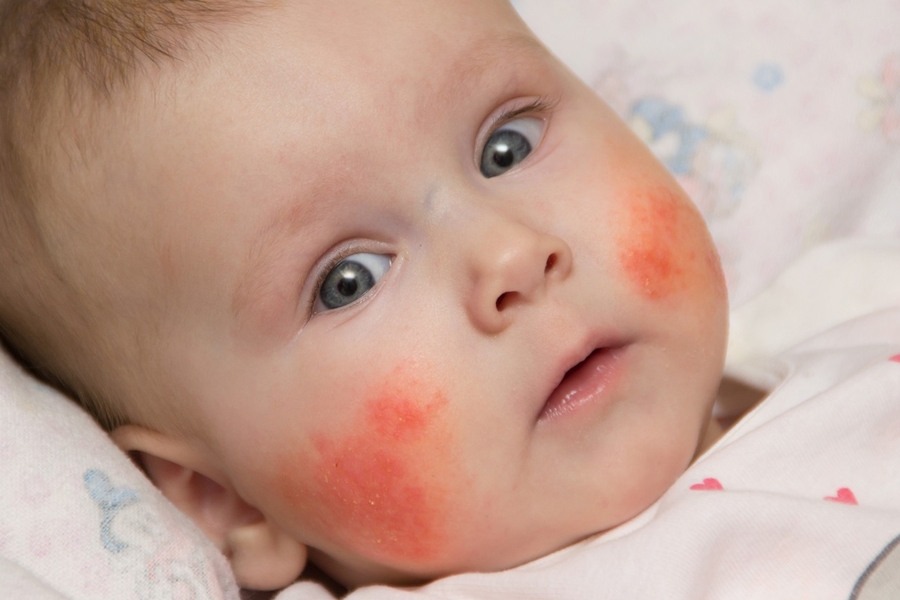
Food Allergies In Babies – A Challenge In Child Care
28 Dec 2017 | 5 min Read
Babychakra
Author | 1369 Articles
Food allergies in babies occur due to a hyperactive immune system
The immune system guards our body from harmful substances. However, sometimes our immune system may identify harmless substances such as some food items as potential trouble makers and launch an attack against them. This is called a hypersensitivity reaction of the immune system, which causes allergies.
Babies with a strong history of allergies, asthma, eczema, and other allergic conditions in the family are likely to develop food allergies.
When do food allergies develop in babies?
Parents with any type of allergy in the family should be observant about any unusual symptom that the baby is likely to develop at the time of introducing new foods in the baby’s diet. Food allergies in babies mainly develop around 4 to 6 months of age during the period of weaning.
Some babies may also show an allergic response to breast milk. This is because the proteins in the food items consumed by mother get secreted in breast milk and produce food allergies in breastfed babies. Atopic dermatitis or eczema is a common form of skin allergy present in breastfed babies. It presents with red, itchy and dry skin on the cheeks, hands, legs, etc.

Common food allergies in babies
Food items that commonly trigger food allergies in babies include cow’s milk, egg, soy, shellfish, wheat, and peanuts.


Food allergies are of two types: immediate allergic reaction (IgE mediated) and a delayed reaction (non-IgE mediated). Immediate allergic responses occur within a few minutes of food intake. Delayed food allergy in babies occurs 2 to 4 hours after the consumption of allergy causing food item. In some cases, both immediate and delayed responses occur at the same time.
Signs of a food allergy in babies vary from mild to severe in intensity.
Mild symptoms include the following:
- Urticaria or hives, which includes red blotches or rashes with or without itching over specific areas or all over the body
- Itching inside the mouth, throat or eyes
- Stuffiness of the nose
Severe symptoms (anaphylaxis) include the following:
- Swelling of the lips, face or tongue.
- Wheezing (whistling sound produced during passage of air through tight airways while breathing). Cough usually accompanies wheezing.
- Difficulty in breathing.
- Diarrhea.
- Vomiting.
The baby presenting with severe symptoms of allergy requires emergency medical attention.
Symptoms of delayed onset allergic reaction are not life threatening and are not very severe in intensity. These include the following:
- Itchy skin with redness around the mouth.
- Abdominal colic or cramps.
- Loose stools with mucus or blood.
- Running nose.
- Watery eyes.
- Cough with wheezing.
Allergy vs. Intolerance
It is important to identify whether the baby has an allergy or intolerance after consuming a food item. Food allergy (or allergy in general) is an immune system mediated response, whereas food intolerance does not involve the immune system.
Signs of food intolerance in babies consist of feeling bloated with gases in the abdomen, diarrhea, vomiting, abdominal pain, etc.
How to prevent food allergies in babies
In 2008, the American Academy of Pediatrics (AAP) released new guidelines for managing food allergies in child care.
- Babies should be exclusively breastfed till minimum 6 months of age. Formula milk should be started only in case of development of food allergies in breastfed infants.
- Introduction of solid foods in the baby’s diet should commence around 4 to 6 months.
- The food items commonly observed to cause allergy should be started as complementary food along with other food items at 4 to 6 months of age.
- Solid food items should be introduced one after the other to observe if they are tolerated by the baby.
- The food items known to cause allergy (cow milk, egg, peanut, soy wheat, etc.) should be introduced between the well tolerated food items. Once the baby tolerates allergy causing food, it should be gradually increased in quantity and frequency. Also, the allergy causing food item should be given to the baby at regular intervals in order to maintain the exposure and develop immunity against the allergy causing substances in the food item.
- The food items likely to cause allergy should be given to the baby for first time preferable when at home and not in a restaurant.
- Delaying food items till the baby turns 1 to 3 years of age does not contribute in preventing food allergies in high risk babies. In fact, it increases the risk of developing that specific food allergy.
- There is no research-based evidence showing that avoiding allergy causing food items during pregnancy and lactation period prevents food allergy in the baby. On the contrary avoiding high nutrient-rich food items during pregnancy and lactation can compromise the baby’s health and nutrition.
- Exception to these guidelines is peanut allergy. Pregnant women with the evidence of peanut allergy in the family or previous child should avoid peanuts during pregnancy. Alternately, the baby can be tested for peanut allergy at 4 months of age before introducing peanuts during weaning.
Source of banner image: today
Disclaimer: The information in the article is not intended or implied to be a substitute for professional medical advice, diagnosis or treatment. Always seek the advice of your doctor.
A


Related Topics for you
Suggestions offered by doctors on BabyChakra are of advisory nature i.e., for educational and informational purposes only. Content posted on, created for, or compiled by BabyChakra is not intended or designed to replace your doctor's independent judgment about any symptom, condition, or the appropriateness or risks of a procedure or treatment for a given person.
